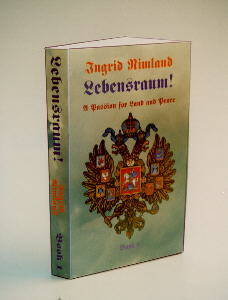

A review by Helmut Becker
It is commonly proclaimed in traditional history books that it was the fault of Germany that brought the world into war, twice in this century. Therefore, the German people must suffer the consequences. And suffer they did - and not just as soldiers at the war front on the ground, in the air, at sea, as prisoners of war in Siberia and in open Allied camps at the Rhein Meadows.
They suffered as refugees when they were disowned and expelled from the German provinces of East and West Prussia, Silesia, Pommerania, the Sudetenland, as well as from German settlements in Rumania, Yugoslavia, the Ukraine and others, lands which they had cultivated for generations.
The accepted, politically correct view is that this "total war" was started by the Germans, and they deserved to be punished. That much of the suffering was purposely and needlessly inflicted upon the German people by the Red Army and also by the British and American allies, continuing in part even after the war had run its course and the guns had fallen silent, is conveniently ignored by the "official" history. That history was written by the victors.
A few courageous writers have bucked the trend of political correctness. James Bacque (Other Losses), David Irving (The Destruction of Dresden) and John Sack (An Eye for an Eye) come to mind. Rejected as "revisionist" by the mainstream, such books are not often found in conventional bookstores and even libraries, and many of them are banned outright in countries such as Germany and France, where public statements contrary to the accepted "truth" are punishable by large fines or imprisonment or both.
Dr. Ingrid Rimland must be added to the growing group of authors who have dared to swim against the stream. In "Lebensraum" she has chronicled the fate of a devout group of ethnic German Mennonites who migrated more than two centuries ago to the Ukraine at the invitation of Catherine the Great, German-born princess and empress of Russia. The German immigrants were given free land to pioneer, protection, self-rule and freedom from conscription in exchange for cultivating the raw land, draining it of swamps and eventually helping feed the Russian people.
In Book I, Rimland brings us from the origin of Apanlee, the first German settlement, up to World War I. Under the able leadership of Peet, son of Peter Neufeld, Apanlee soon prospers, becoming the envy of surrounding villages. Striving toward progress through hard work and traditional Christian values, "...in years to come, Apanlee became a peerless showcase farm."
The German settlers enjoyed an excellent, long-lasting relationship with the Czars, and they proved to be loyal subjects. When Peet Neufeld, their leader, married Greta, they named their children Peter, Alexander and Nicholas in honor of the monarchy. A new town "Alexanderwohl" is founded by Peet. A friendly visit early on by a Russian princeling confirms the good relationship between the Czarist House of Romanov and the Germans.
Rimland creates an interesting counterpoint to the industrious Neufelds with the pious Epp family. Peter Neufeld and his son Peet are industrious, inventive, eager to plow the land. Willy Epp and his followers are the preachers and the elders of the church. Peet builds a school - the elders are against it. Peet Neufeld strives toward progress - Willy Epp and the elders oppose it. Indeed, Willy's son Class Epp, an odd child and religious zealot by all accounts, would later lead a trusting flock of mesmerized followers on a disastrous trek East into the uncharted wilds of Russia in a vain search for unspoiled new "Lebensraum" for his religious splinter group.
Another branch of the two families, Nicky Neufeld and Lizzy Epp, together with their offspring, succumb to the lure of America and emigrate to Kansas in 1874. Unfortunately, Nicky drowns in a devastating storm while crossing the Atlantic. Swindled out of their money by some land agents from Santa Fe, Lizzy and her son Jan lay claim to a tract of land near Wichita, Kansas, with a tiny hut, a leaky roof and a broken window. Two dollars is all that Lizzy had in her pocket and a box of hardy winter wheat that would become the seed for the Midwestern bread basket that would one day not only feed America but, eventually, a hungry world.
Through skillful dialogues Rimland recreates the contrasting personalities of the founders of the two families in America: Lizzy, a born Epp, pessimistic about their future in the new world, suffers from homesickness for distant Apanlee. Jan Neufeld, a young man by now, is literally bursting with optimism and his "we'll make it" attitude. Jan emerges as the new leader of the community which he called "Mennotown".
The story now ebbs and flows in parallel on both continents, deep in the Ukraine in the Russian empire and in Kansas at the center of the new world. Traditions pass from generation to generation, but subtle, barely noticeable changes are afoot. As Book I comes to a close, we are at the brink of revolution in Russia. In Apanlee, the recalcitrant illegitimate son of Hein Neufeld and the winsome Ukrainian maid Natasha serves as a foreboding harbinger of the brutish bestiality of the anarchist mob to come. The watch-word is "Equality" - a concept bent on destroying the established order (i.e. the Czar and Apanlee) and its traditional values. In the last Chapter of Book I, just prior to the outbreak of World War I and the Russian Revolution, Rimland creates a fearsome mood, the revolutionary embers glowing under the surface, soon to erupt in open flames and blood.